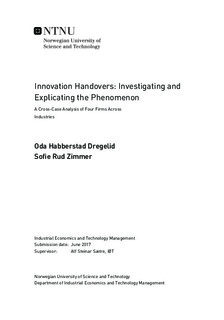Innovation Handovers: Investigating and Explicating the Phenomenon - A Cross-Case Analysis of Four Firms Across Industries
Master thesis
Permanent lenke
http://hdl.handle.net/11250/2473728Utgivelsesdato
2017Metadata
Vis full innførselSamlinger
Sammendrag
The objective of this Master s thesis is to define, explicate and investigate the heretofore-underexplored phenomenon of innovation handovers. Given the complexity and interdisciplinary nature of many innovation projects, we believe that researching how innovation projects are handed over between various organizational units, will contribute to a better understanding of why and how innovation activities fail. Based on literature on handovers in other industries, along with innovation and organizational literature, we have developed a conceptual framework. This framework has structured the empirical investigation in this thesis, where we have performed a qualitative cross-case study on how innovation handovers are carried out in practice, as a part of companies innovation processes. Here, employees from four Norwegian companies, across industries, have been interviewed.
Our findings indicate that innovation handovers have prevalence, and give insight into how innovation handovers are carried out in practice. Despite the case companies differences in business models, practices, and innovation work, all case companies have innovation handovers, where a transfer of information, responsibility and/or control for an innovation project occurs between organizational units. We have found that innovation handovers are not straightforward, linear or easy, and should rather be described as an iterative process. Innovation handovers are found to occur both within companies, and with external actors. Further, the execution of innovation handovers varies, and is tightly linked to how the companies structure their innovation work. Here, we have identified tradeoffs between the extent of integration and the number of handovers, and between formalization and flexibility. Also, we found that innovation handovers are highly influenced by factors in the organizational context in which they occur.
In our study, we have identified several challenges that companies face in innovation handovers: different motives, goals, and ways of thinking; ambiguity; lack of psychological ownership and commitment; poor communication; inadequacies in management and leadership; an unsupportive cultures and climates. If these challenges are not overcome, the innovation project can be developed in wrong directions, die out or be terminated. Our study shows that the case companies overcome these challenges through employee involvement, key employees, and goal alignment.
As an exploratory case study, the findings in our thesis prepare the ground for further research. We suggest further research to determine our findings applicability beyond the limitations of our sample. Also, we suggest further research to improve our understanding of innovation handovers, and their relationship to the contexts in which they occur.
